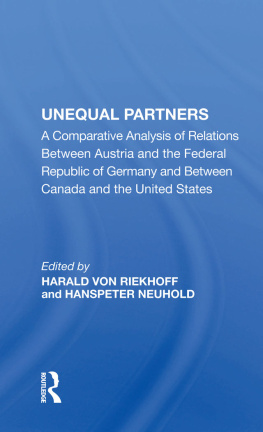First published 1987 by M.E. Sharpe
Published 2015 by Routledge
2 Park Square, Milton Park, Abingdon, Oxon OX14 4RN
711 Third Avenue, New York, NY 10017, USA
Routledge is an imprint of the Taylor & Francis Group, an informa business
Copyright 1987 Taylor & Francis. All rights reserved
No part of this book may be reprinted or reproduced or utilised in any form or by any electronic, mechanical, or other means, now known or hereafter invented, including photocopying and recording, or in any information storage or retrieval system, without permission in writing from the publishers.
Notices
No responsibility is assumed by the publisher for any injury and/or damage to persons or property as a matter of products liability, negligence or otherwise, or from any use of operation of any methods, products, instructions or ideas contained in the material herein.
Practitioners and researchers must always rely on their own experience and knowledge in evaluating and using any information, methods, compounds, or experiments described herein. In using such information or methods they should be mindful of their own safety and the safety of others, including parties for whom they have a professional responsibility.
Product or corporate names may be trademarks or registered trademarks, and are used only for identification and explanation without intent to infringe.
Translated by Michel Vale
Library of Congress Cataloging-in-Publication Data
Comparative studies of social structure.
Published simultaneously as vol. XVII, no. 1-2 of International journal of sociologyVerso of t.p.
Bibliography: p.
Contents: Intergenerational and career mobility in the Federal Republic of Germany and the United States / Peter Kappelhoff and Wolfgang TeckenbergEmployment and career mobility of women in France and the Federal Republic of Germany / Wolfgang KnigEntry into the labor market and occupational career in the Federal Republic of Germany / Hans-Peter Blossfeld[etc.]
1. Social structureGermany (West). 2. Social structureUnited States. 3. Social structureFrance. I. Teckenberg, Wolfgang. HN445.5.C66 1987 305.0943 86-33866
ISBN 13: 9780873324083 (hbk)
The reader of this book should know a little bit about the development of the collaboration that made it possible. A Marshall Foundation Fellowship grant enabled the editor to do research at the University of Wisconsin and at Columbia University during 1981/82. I am deeply indebted to the German Marshall Foundation and especially to the program coordinator, Peter R. Weitz. During my stay in the United States I benefited greatly from advice on the second wave of the American Occupational Change in a Generation study conducted by David L. Featherman and Robert M. Hauser. I also would like to acknowledge helpful comments on methodology from Robert D. Mare, Aage B. Srensen, Seymour Spilerman, and other colleagues I met in Madison, Wisconsin, and in New York City.
While acknowledging the standards of excellence of the well-established research teams at the universities I visited in the United States, we have a more modest aim for this volume, namely, to present to the American reader some empirical inquiries into social stratification and mobility in the Federal Republic of Germany in a comparative perspective. Even this goal proved ambitious enough. We cannot claim, of course, to have assembled in this book the most prominent German-speaking researchers on comparative stratification. The intention was rather to establish an agenda for further fruitful cross-societal discussions and comparative research by introducing some younger German sociologists and presenting some of their studies, hitherto unpublished in English-language editions.
The authors all share an empirical orientation in their stratification research and pay tribute to the helpful comments of their teachers and consultants, especially Karl-Ulrich Mayer, Walter Mller, and Franz U. Pappi. We also benefited from the comparative mobility studies of Robert Erikson and John H. Gold-thorpe.
Further contributions are acknowledged in the texts, but I would like here to thank the German Research Foundation (Deutsche Forschungsgemeinschaft) for providing me with a grant for gathering some of the data (ZUMA-Bus 1982) that made the article by Peter Kappelhoff and me possible. Last but not least our appreciation goes to Michel Vale for editorial efforts beyond the call of a translator.
Since presumably many readers may be unfamiliar with some peculiarities of the German occupational and institutional system, I would recommend that they should not start with the summary at the end of the book. While each essay stands on its own, it was our intention to explain some of the differences between Germany and the United States in the first article. We further suggest (in the second essay) that career mobility in France has more in common with social mobility in the United States than in Germany. The third essay, while not an explicitly comparative analysis, was included because it clearly shows the close links between the educational and occupational systems in Germany, a source of major differences with the United States, at least until the 1980s.
The last section contains analyses of income attainment. Drawing on studies in the United States conducted by Erik O. Wright, the fourth essay compares the effects of education and position on income attainment. Since these can be construed as class effects, we were also curious about other types of potential positional and nonvertical income differences in a comparison of France, the United States, and the Federal Republic of Germany (the fifth essay). The concluding summary is very brief, giving only preliminary answers to the more detailed questions raised in the comparative empirical research projects.
We hope that the effect of our work will be to stimulate interest and provoke discussion and criticism, thus contributing to our understanding of these three very different societies.
WOLFGANGTECKENBERG
PETER KAPPELHOFF and WOLFGANG TECKENBERG
Wolfgang Teckenberg is an assistant professor in the Institute of Sociology at the University of Heidelberg. Peter Kappelhoff is an assistant professor in the Institute of Sociology at the University of Kiel.
At least since the appearance of Alexis de Tocquevilles classic work on democracy in America, the United States has enjoyed the reputation of being the quintessential open society. Karl Marx and Friedrich Engels, and later, at the turn of the century, Werner Sombart also addressed questions on this theme, in particular with regard to the chances of a socialist labor movement developing in the United States. All stressed the importance of low social barriers, but also better pay and above all the better chances for advancement for American workers. In America, individual mobility seems to function as a surrogate for class formation and social and political conflict, an argument systematized by Hirschman in his book










